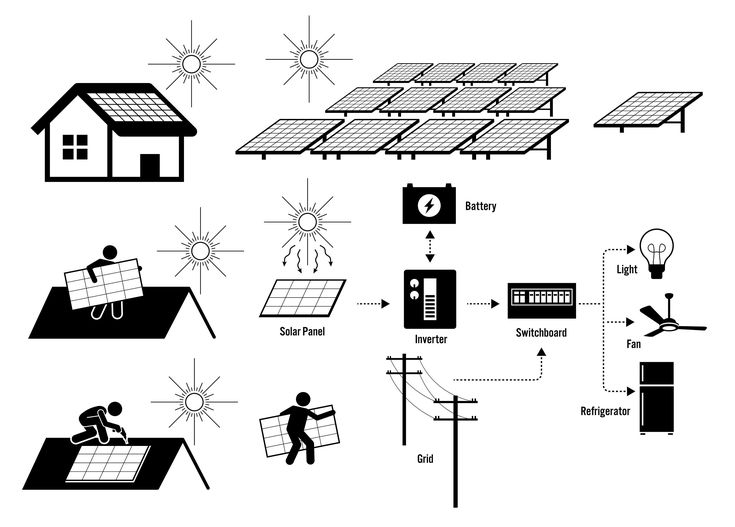Solar Inverters and Batteries

Solar Inverters and Batteries
Solar inverters and batteries are crucial components of a solar power system, working together to ensure reliable and efficient energy usage. They play a vital role in converting solar energy into usable electricity and storing excess energy for future use, providing uninterrupted power even during outages or low sunlight conditions
Solar Inverters
A solar inverter converts the direct current (DC) electricity generated by solar panels into alternating current (AC) electricity, which is compatible with home appliances and the power grid.
Types of Solar Inverters
String Inverters:
- Commonly used in residential and commercial setups.
- Connects multiple panels in a string for centralized power conversion.
Microinverters:
- Installed individually on each solar panel.
- Offers panel-level optimization, ensuring better performance.
Hybrid Inverters:
- Combines inverter functionality with battery management.
- Supports both solar energy conversion and energy storage.
Central Inverters:
- Used in large-scale solar farms.
- Manages high-capacity energy conversion.
Benefits of Solar Inverters
- Converts DC to AC for compatibility with appliances.
- Monitors system performance and energy output.
- Enhances efficiency by optimizing energy usage.
Solar Batteries
Solar batteries store the excess energy generated by solar panels for use during nighttime, cloudy days, or power outages. They enable energy independence and maximize the benefits of solar power systems.
Types of Solar Batteries
Lithium-Ion Batteries:
- Lightweight, long-lasting, and high energy density.
- Ideal for residential and commercial setups.
Lead-Acid Batteries:
- Cost-effective and reliable for off-grid systems.
- Requires regular maintenance.
Flow Batteries:
- Best suited for large-scale storage with high durability.
- Offers long charge-discharge cycles.
Nickel-Cadmium (Ni-Cd) Batteries:
- High durability and temperature resistance.
- Typically used in industrial applications.
Benefits of Solar Batteries
- Provides backup power during outages.
- Reduces dependency on the grid.
- Enhances energy efficiency by storing excess solar energy.
- Supports off-grid and hybrid solar setups.
Integrated Functionality
Solar inverters and batteries together form the backbone of energy management in a solar system.
- Hybrid Systems: Combine solar panels, inverters, and batteries for seamless energy conversion, storage, and usage.
- Energy Monitoring: Advanced inverters and battery systems come with monitoring capabilities to track energy generation and consumption.
Applications
- Residential: Power backup and energy efficiency for homes.
- Commercial: Ensures uninterrupted operations for offices and businesses.
- Industrial: Supports energy-intensive processes with reliable storage and conversion.

